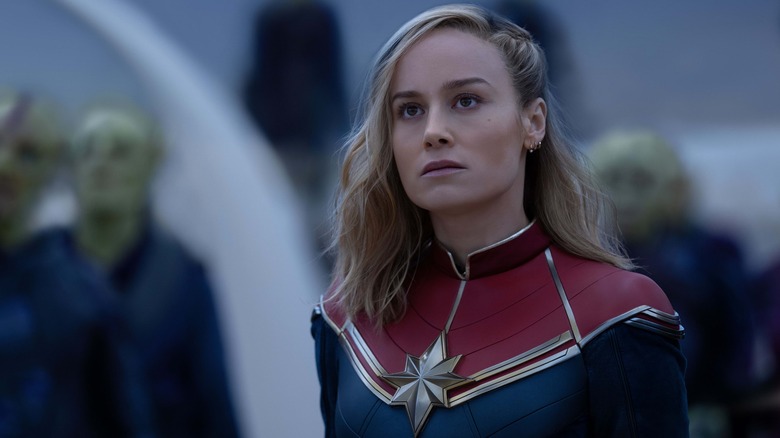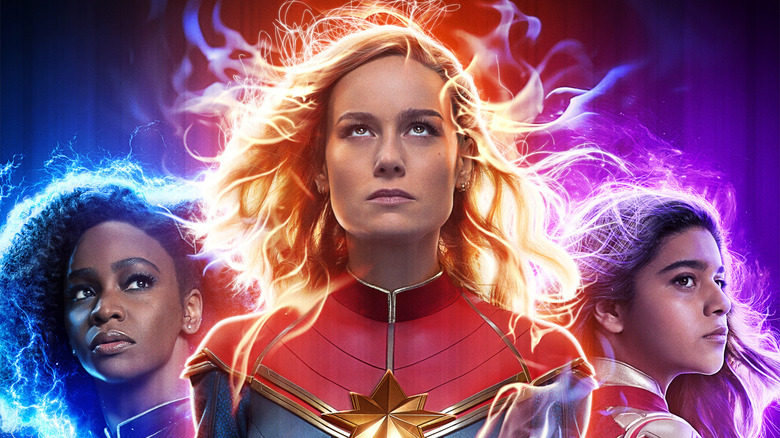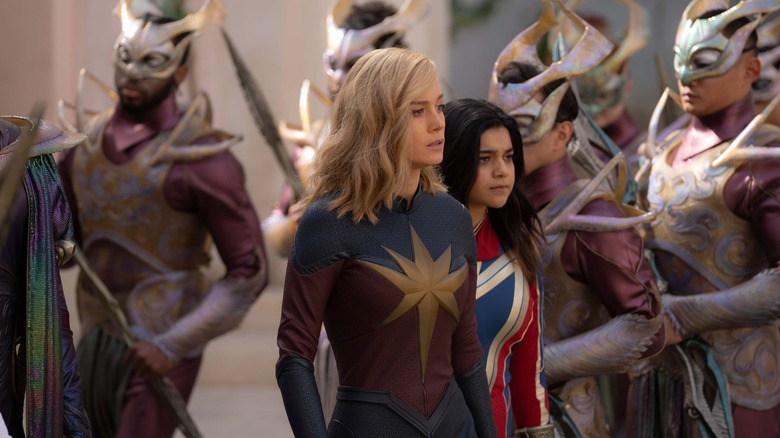The Marvels Box Office Points To A Major Problem In Hollywood, Not Just Marvel
"The Marvels" arrived in theaters this past weekend and the box office posted by the film has led to much warranted discussion. The latest entry in the Marvel Cinematic Universe, a sequel to 2019's "Captain Marvel," opened to just $47 million domestically, well below expectations. It also only took in $63.2 million overseas, meaning the movie had a global opening of $110.2 million against a budget said to be anywhere between $220 and $250 million — before marketing. That's bad news for Marvel Studios and Disney, to put it lightly.
That said, an opening weekend in the $50 million range shouldn't have to immediately spell disaster. Any movie that can pull in more than $100 million around the world in three days clearly has a great deal of appeal and a sizable audience. The bigger problem here is that the movie business is a game of relativity. A movie like "Teenage Mutant Ninja Turtles: Mutant Mayhem" can be considered a success by making $180 million worldwide because it only cost $70 million to produce. A movie like "The Little Mermaid," meanwhile, is at best a mixed bag despite taking in $569 million worldwide because of its huge $250 million budget.
Unfortunately for Disney (and Hollywood in general), bigger budgets have become the norm in recent years. It used to be that a $200 million budget was a rare exception worthy of raising an eyebrow over when such a thing did occur. Now? Something like "John Wick: Chapter 4" getting made for $100 million seems downright thrifty, even if that is still arguably a bit expensive for a franchise that made its hay in the mid-budget realm. But who's going to argue against $440 million worldwide? It worked out in that case. It doesn't always, however, and that's the problem that Marvel Studios and everyone else is having to contend with right now.
Big budgets, bigger problems
In fairness to "The Marvels," "Captain Marvel" was a gigantic hit that made $1.12 billion worldwide. If Marvel Studios was going to give any sequel a big budget, this didn't seem like a bad bet. Director Nia DaCosta did what she was asked to do, it's not her fault that Disney is now left holding the bag. The problem is that the MCU got absorbed by its own success and these $200 million budgets became standard issue. We haven't had an MCU film made for less than that amount since "Spider-Man: Far From Home" ($160 million) in 2019, but that was a Sony Pictures release. As far as Disney goes? We have to go back to "Captain Marvel" ($175 million).
Early reports indicated that "Shang-Chi and the Legend of the Ten Rings" was made for $150 million, but later reports confirmed that number to be closer to $200 million. In any event, the established pattern has unquestionably been bigger budgets, which carries with it bigger risk. Admittedly, it is very tough to make a big superhero movie on the cheap. That's why something like "Shazam!" ($363 million worldwide/$100 million budget) is impressive when it happens. But that's also more of an exception. Even "Iron Man," which kicked off the MCU more than 15 years, had a budget in the $140 million range.
Understandably, Disney and Marvel Studios presumed the gravy train would never stop rolling after a run in 2018 and 2019 that included "Black Panther" ($1.33 billion worldwide), "Avengers: Infinity War" ($2 billion worldwide), "Ant-Man and the Wasp" ($623 million worldwide), "Captain Marvel" ($1.12 billion worldwide), "Avengers: Endgame" ($2.8 billion worldwide), and "Spider-Man: Far From Home" ($1.13 billion). And "Endgame" was, for a time, the highest-grossing movie ever. But the pandemic brought with it long-lasting, industry-wide change, and those days are very much in the rearview mirror. Future success on that level can no longer be presumed.
The new norm must be less expensive
The pandemic not only forced Hollywood to shut down for the better part of the year, but it pushed the industry rapidly towards streaming. Disney+ launched and, with that, Marvel needed to become an anchor for the studio's streaming arm as well. So, not only were we going to have several MCU movies in theaters per year, but we were going to have in-universe shows to keep up with as well, beginning with "WandaVision" in 2021. Consumer habits changed. Watching stuff at home became the unquestioned default.
The MCU shows have also been a mixed bag overall, critically speaking. That has helped to divide the audience's attention and seemingly make the movies feel less special/essential. It was all too much, too fast. All the while, Disney and Marvel Studios were making more expensive, riskier superhero films.
"Eternals" is a prime example of a very risky property that didn't pan out, making just over $400 million worldwide against a hulking $200 million budget. It might have been wiser to try and make that movie for $150 million (give or take) and test the waters. $200 million or more simply can't be the default. I'm not just picking on Marvel either. I have railed against Hollywood's budget problem in the past. It's a big issue that must be addressed sooner rather than later.
Audiences have demonstrated that a superhero movie is no longer automatically going to be considered essential viewing. That's a big problem for the MCU as everything is connected. If audiences missed "WandaVision," "Doctor Strange in the Multiverse of Madness" made a whole lot less sense, for example. The continuity issue in the MCU is another discussion, but it all comes back to mitigating risk. Disney has to take a long, hard look at the budget issue. Marvel Studios is (or perhaps was) a reliable backbone for the company that it can't afford to lose. A "less is more" approach may be the way to go so that movies like this aren't doomed from the outset.
"The Marvels" is in theaters now.


